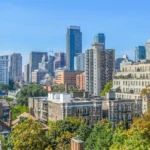In this blog, we’ll walk you through the main closing costs when buying a home in Canada, when they come into play, and how to budget for them. Think of it as your financial checklist to make sure there are no surprises on closing day.
The Hidden Costs of Closing on a Home in Canada
You’ve saved for your down payment. You’ve found the perfect place. Maybe you’re already daydreaming about paint colours and Friday night dinners in your new kitchen. But hold on — the journey to homeownership in Canada doesn’t end with your mortgage approval or that big, beautiful down payment.
Before you get the keys and start unpacking, there’s one final hurdle: closing costs when buying a home in Canada.
While the down payment often steals the spotlight, there’s a list of other expenses that can sneak up on you if you’re not prepared. Closing costs when buying a home in Canada can add up to 1.5% to 4% of the purchase price of your home — and most of them are not optional.
What Are Closing Costs?
Closing costs when buying a home in Canada are the legal, administrative, and tax-related expenses that come with purchasing property — above and beyond your down payment and mortgage. They cover things like legal fees, home inspections, land transfer taxes, and even interest adjustments on your mortgage.
Some of these costs are due before closing day, while others are paid on or shortly after you get the keys.
Let’s break it down into simple, easy-to-understand terms for buyers navigating closing costs when buying a home in Canada.
You might also be interested in: Your Complete Guide to Mortgages in Canada: Smart Tips for Homebuyers
Pre-Closing Costs: What You Pay Before the Keys
Before the actual closing, there are a few optional but highly recommended costs that can protect your investment and help you make smarter choices.
1. Home Inspection (Optional, but Worth It)
Think of this as a reality check.
A home inspection gives you a clear picture of the property’s condition. An inspector will check the roof, plumbing, electrical systems, insulation, foundation — basically everything that can cost you serious money down the road. If there are major issues, you might be able to negotiate repairs, ask for a price reduction, or even back out of the deal.
- Typical cost: $300 – $600
2. Property Appraisal
Your mortgage lender may require a property appraisal to confirm that the home’s value matches the loan amount. They want to be sure the property is worth what you’re paying — especially if you’re putting down less than 20%.
Typical cost: $500 – $1,500
3. Land Survey
A survey outlines the exact boundaries of the property and shows features like fences, driveways, or shared spaces. Some lenders require an updated survey to finalize the mortgage. In some cases, the seller may have a recent one you can use — otherwise, you’ll need to hire a professional surveyor.
Typical cost: $1,000 – $5,000
4. Title Insurance
Your lawyer may recommend title insurance, and your lender might require it. It protects against issues like title fraud, zoning problems, and undisclosed liens that could affect your ownership rights.
There are two kinds of policies: one for you as the owner, and one for the lender. You’ll usually pay this once, and it’s included in your legal fees.
Typical cost: $250 – $1,000 (usually bundled with legal costs)
5. Mortgage Life or Disability Insurance
This isn’t required most of the time, but it’s worth thinking about. If something unexpected happens — like illness, disability, or job loss — this insurance can help cover your mortgage payments. It gives you peace of mind, especially if you’re buying a home with a partner or supporting a family.
Cost: Varies by coverage and age, ask your lender for options.
6. If applicable, Bridge Loan
If you’re selling your current home and buying a new one, but the closing dates don’t line up, you may need a bridge loan. It’s a short-term loan that gives you access to your existing home’s equity to help fund your new purchase.
Cost: Varies based on lender and loan amount.
7. Property Insurance
This is non-negotiable — your mortgage lender will require you to have property insurance in place before they release any mortgage funds. The insurance must cover the home’s replacement value in case of fire or major damage.
Cost: $1,000 – $2,500 per year (depending on the property and coverage)
Closing Day Costs: The Final Stretch
Now you’re nearly at the finish line. But before you move in, there are a few more checks to write — and each is part of closing costs when buying a home in Canada.
8. Legal Fees and Disbursements
You’ll need a lawyer or notary to handle the legal paperwork — reviewing contracts, registering the home in your name, and ensuring all funds are properly transferred. “Disbursements” are the additional costs your lawyer pays on your behalf (like land title searches, courier charges, and filing fees).
Typical cost: $1,000 – $2,500 (depending on province)
9. Land Transfer Tax (LTT)
This is one of the largest and least-loved closing costs. Land transfer tax is calculated based on the purchase price of your home and varies by province. Some municipalities — like Toronto — charge an additional municipal LTT on top of the provincial one.
Good news: First-time homebuyers may be eligible for partial or full rebates, depending on where you live.
Cost: 0.5% – 2.5% of the purchase price (varies by province and city)
Use our calculators to get an accurate land transfer tax budget.
10. Interest Adjustment
This is a one-time interest payment if your mortgage funds are released before your first official mortgage payment date. For example, if you close on the 15th of the month but your mortgage payments are set for the 1st of the following month, you’ll pay interest from the 15th to the 1st.
Closing costs when buying a home in Canada often include these small but invitable charges.
Tip: You can sometimes avoid this by setting your first payment date to line up with your closing day.
Cost: Depends on mortgage amount and interest rate
11. Prepaid Property Taxes, Utilities, and Condo Fees
The seller may have already prepaid certain costs — like municipal property taxes, water bills, or condo maintenance fees. If that’s the case, you’ll need to reimburse them for the time after you take ownership.
Cost: Varies widely — your lawyer will calculate the exact amount
12. Mortgage Default Insurance (CMHC Insurance)
If your down payment is less than 20%, you’ll need to pay for mortgage default insurance, also called CMHC insurance. This protects the lender if you default on your loan. The premium is based on your mortgage amount and is usually rolled into your mortgage. But here’s the catch: in Ontario, Quebec, and Saskatchewan, you also pay provincial sales tax on the insurance premium — and that must be paid upfront.
Closing costs when buying a home in Canada often surprise first-time buyers here.
Cost: 2.8% – 4% of your mortgage amount (only if down payment <20%)
13. GST or HST on New Homes
If you’re buying a newly built home or a substantially renovated property, you might have to pay GST or HST. Fortunately, most builders include this in the sale price. But always check the fine print — you may need to pay it separately at closing.
Tip: You may qualify for a GST/HST rebate if the home is your primary residence.
You might also be interested in: Bye-Bye Rent! How to Buy a Home in Canada, Your Step-by-Step Guide
Bonus Tip: Budget for the Unexpected
Even with a detailed checklist, surprises can pop up. Maybe your move gets delayed and you need storage. Or you discover your new home needs new locks, curtains, or a last-minute plumber.
We recommend setting aside an extra $2,000 – $3,000 as a buffer — just in case. It’s all part of being fully prepared for closing costs when buying a home in Canada.
You might also be interested in: Your Roadmap to Paying Off Your Mortgage Sooner
How Much Should You Budget for Closing Costs?
Here’s a general rule of thumb: set aside 3% – 4% of your home’s purchase price to cover closing costs when buying a home in Canada.
Let’s break that down:
- On a $500,000 home, that’s $15,000 – $20,000
- On a $700,000 home, that’s $21,000 – $28,000
That might sound like a lot — especially on top of your down payment — but being prepared means less stress, fewer surprises, and a smoother transition into homeownership. If you have questions or need guidance, contact our team. We’re here to help you every step of the way.






